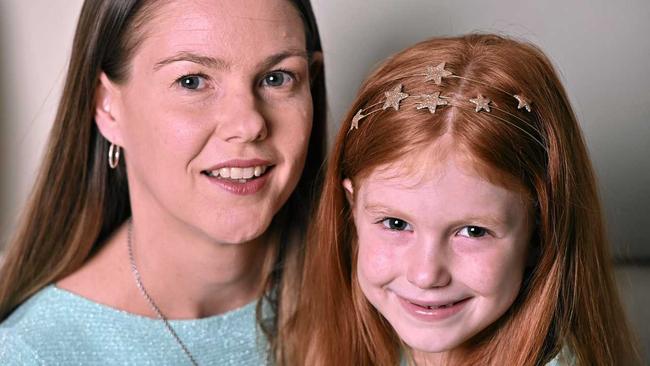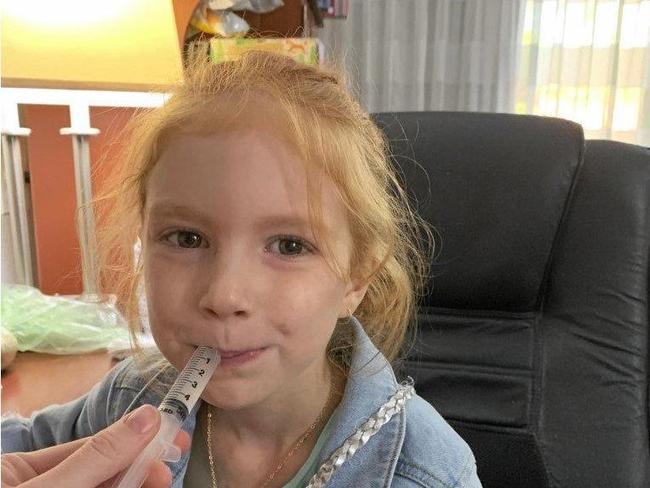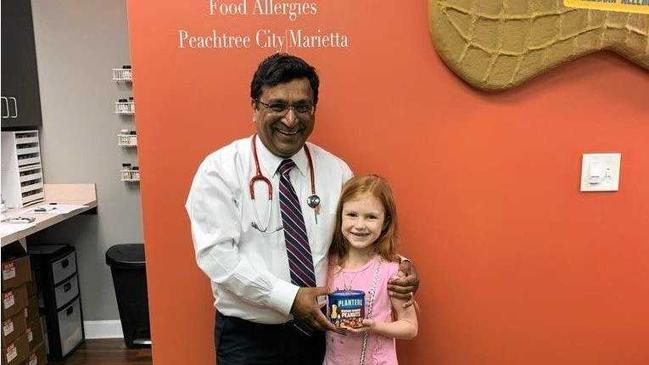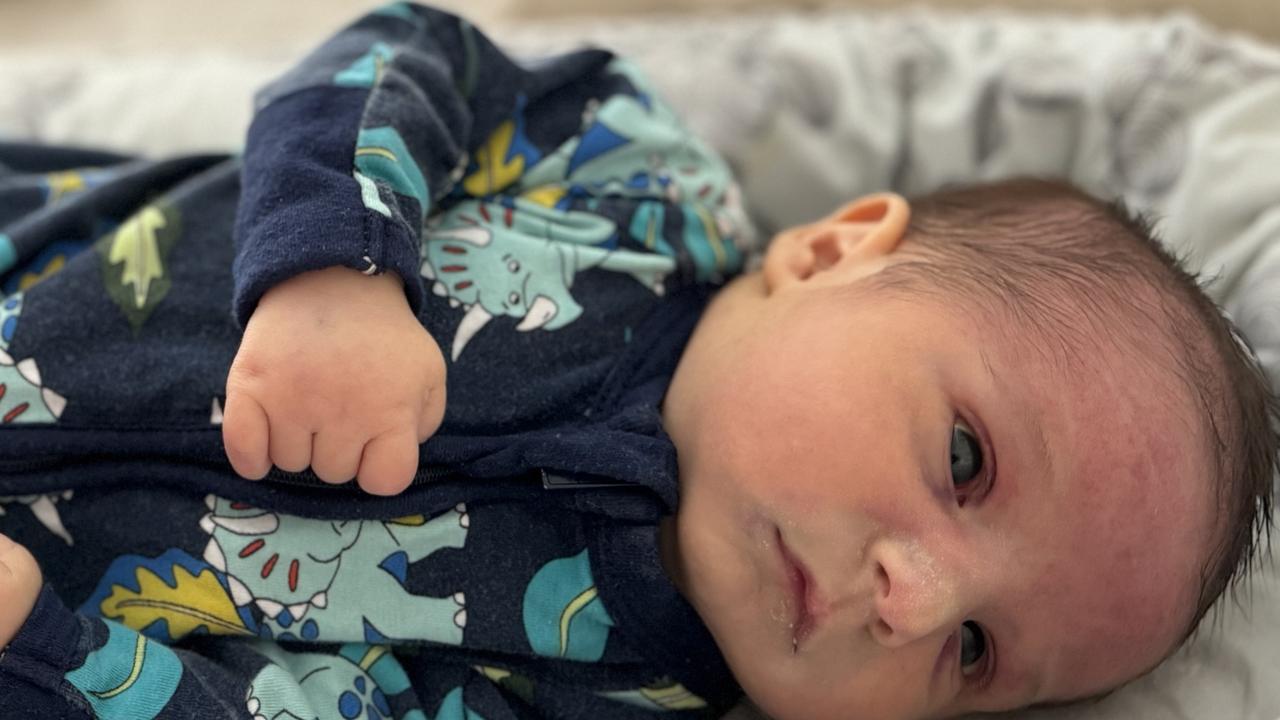Peanut allergy: How oral immunotherapy changed our lives
A couple of months ago, Zalia could have gone into anaphylactic shock after the slightest trace of allergen but now there's barely a reaction.

Coffs Harbour
Don't miss out on the headlines from Coffs Harbour. Followed categories will be added to My News.
EVERY time Catherine Sly hears ambulance sirens, a shiver goes down her spine.
When her daughter Zalia was four-years-old she went into anaphylactic shock and was rushed to hospital, transferring to a special care ambulance on the side of the highway en route.
She was injected with an EpiPen and given two further shots of adrenaline.
"It was the absolute scariest moment of my life," Catherine said.
"When an ambulance passes me with the sirens... it just takes me back to that emotion of the absolute terror of seeing your child going downhill and not being able to do anything about it,: Catherine said.
"What if that happens again... that was always in my mind."
Little Zalia, 7, is allergic to peanuts, eggs and milk.
Her mother had spent years researching online to find a way to combat the allergies and fell on the trail of oral immunotherapy (OIT).
She attended a seminar held by Dr Douglas Jones in Brisbane two years ago, who spoke about the tremendous results his patients had achieved using the treatment across an eight-month program at his clinic in the United States.
The treatment involves desensitising patients to whatever they are allergic to by introducing minuscule amounts of the food and slowly increasing it until the patient can eat a 'safe amount'.
This can be done to a point where they can freely eat the food or just enough to protect them from accidental cross contamination.
Spending that long away from home was just not viable but Catherine was on the right path and eventually found the answer to her prayers.

It isn't offered in Australia and she found Dr Ruchir Agrawal, based in the United States, had been getting positive results using OIT in about six weeks.
So after much back-and-forth with Dr Agrawal, Catherine and Zalia headed over to America in April to undertake treatment at the Freedom Allergy clinic in Peachtree City, Georgia.
They were joined by people from all the world, who had sought out Dr Agrawal's expertise that doesn't exist in their own countries.
The Slys spent much of the next four-and-a-half weeks at the clinic and Zalia took to the treatment for her severe peanut allergy quickly.
Back home in Camira, Zalia is only two months into the carefully controlled program but already at a level which keeps her safe from accidental exposure. If a kid at her school had peanut butter for breakfast, didn't wash their hands and touched Zalia, she would barely have any reaction.
In the past she would have had an anaphylactic shock.
As the treatment progresses, accidentally eating an entire nut won't cause a severe reaction either.
At the moment, she takes exactly 840 milligrams of peanuts a day and will work up to 7000 milligrams over the course of the next three years.
Once that point is reached, it is enough for 50 per cent of patients to be desensitised and they just have to keep a small amount in their weekly diet.
Zalia did treatment for her egg and milk allergies and good progress has been made on those fronts as well.
"You can't control the environment of where they are, and that is just such a relief for myself and for my husband to not have to stress about things like that," Catherine said.
"It's literally changed our entire lives in a couple of weeks.
"She's got a way to go. She's currently on one peanut a day. That protects her from any cross contamination or anything like that, if she were to eat a meal that included more, she may still have a reaction but even at this point it would be a much much smaller reaction than it would have been two months ago."
Australia needs to 'catch up'
BY sharing her daughter's story, Catherine Sly aims to raise awareness about the treatment and wants Australia to "catch up with the rest of the world" by embracing it.
The Australasian Society of Clinical Immunology and Allergy said until OIT and other treatments for food allergy are proven and standardised for routine use, and shown to be "safe to undertake at home", avoidance of confirmed food allergens is recommended for the management of food allergy.
"Current OIT methods are not a cure for food allergy," a recent report reads.
In total, the trip cost the Slys $24,000 including the treatment ($5500), flights, travel, food and accommodation.
"Australia's official line is that until they can have a standardised treatment, they don't recommend any doctors do it," Catherine said.
"No doctors in private practice in Australia are doing it.

"The whole point of it is that it's not standardised. Children aren't standard, everyone's got a different allergy, size, weight and age.
"In Australia they're aiming for the wrong goal I believe."
A GP is needed to do routine blood tests for Zalia and Catherine is in regular contact with Dr Agrawal.
"If Zalia gets sick we have a whole plan from Dr Agrawal that says you reduce the dose, reduce it to this much, then plan to increase it back up," she said.
She warned the treatment should only be undertaken under advice from a doctor.
"It's safe, it's made an amazing difference to her life and to our family's life. She'd never been able to try ice cream or Tim Tams or pizza or anything like that.
"This amazing world has opened to her of so many things that normal people just take for granted."
Originally published as Peanut allergy: How oral immunotherapy changed our lives


